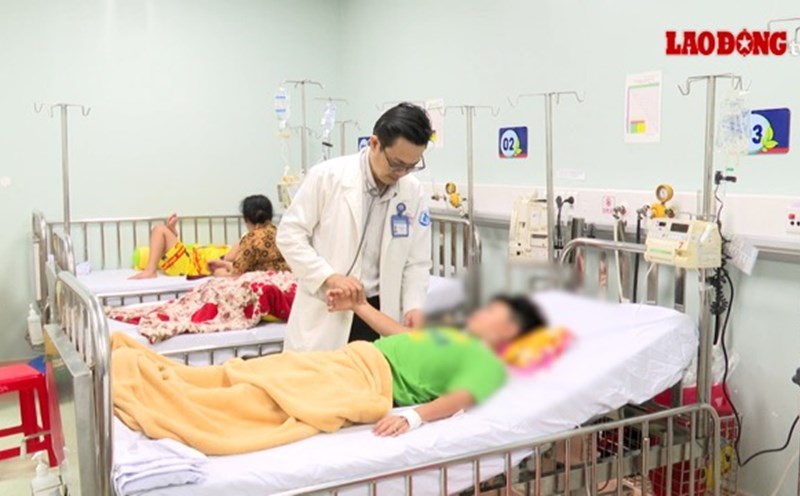Patient TG.B (12 years old, male, Long An province) had dengue fever and was hospitalized at the City Children's Hospital. According to the medical history, the child had a high fever for 4 days, accompanied by a dry cough and body aches, so the family treated him at home and gave him unknown medicine.
On the fourth day, the child began to have abdominal pain below the navel, had a nosebleed that stopped on its own, and vomited once. After being examined at a private hospital and having an abdominal ultrasound, the doctor discovered appendicitis, so the child was quickly transferred to the City Children's Hospital.
Here, the patient was noted to be lethargic, with pink lips, breathing rate of 20 times/minute, pulse rate of 100 times/minute, rough lungs, soft abdomen but bloating. To accurately diagnose the condition, the doctor performed an abdominal CT scan, which recorded free air in the abdomen and suspected perforation of the pyloric antrum and inflammation of the pyloric antrum. The image also showed gallbladder wall edema associated with dengue fever.
Doctor Nguyen Minh Tien, Deputy Director of the City Children's Hospital, said that the patient suffered from a perforated viscera and dengue fever on the fourth day. After an interdisciplinary consultation, the patient underwent laparoscopic surgery.
Surgery revealed turbid yellow fluid in the abdomen, a 3x3 mm perforation in the anterior aspect of the duodenum, inflammation of the surrounding tissue, bile reflux, distended gallbladder, and normal appendix.
“After suturing the hole, we washed each area of the abdomen until the water was clear, placed a drainage tube next to the mouth, and transferred the patient to the Surgical Intensive Care Unit for intensive treatment,” Dr. Tien added.
The post-operative diagnosis was duodenal perforation in a child with dengue fever. This is a rare case, as previously only a few cases of duodenal perforation in adults due to dengue fever have been reported, and none have been reported in children.
Although it is the end of the year, the erratic weather and rains still exist, creating favorable conditions for Aedes mosquitoes to develop and cause dengue fever. Therefore, both medical staff and parents should not be subjective, need to detect the disease early and take children to the hospital promptly.
Parents need to monitor for signs such as high fever lasting more than 2 days and take their child to a medical facility immediately if they have the following symptoms: fussiness, restlessness, tossing and turning, or lethargy, abdominal pain, nosebleeds, bleeding gums, vomiting blood, black stools, cold hands and feet, lying in one place, not playing, refusing to breastfeed or eat.
Currently, in Vietnam, there is a dengue fever vaccine for children 4 years of age and older, with 2 doses given 3 months apart, with a protective effect of over 80%.











